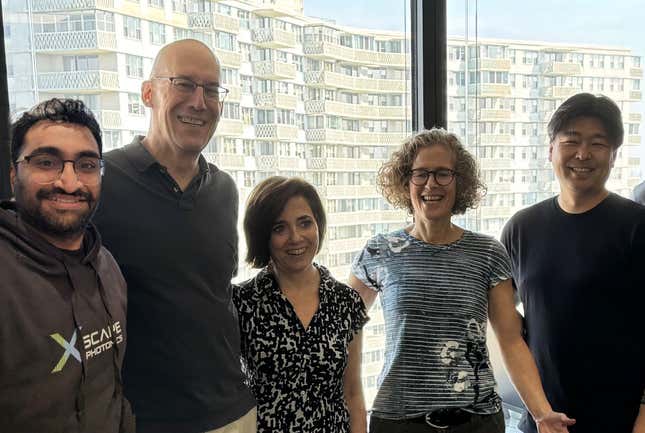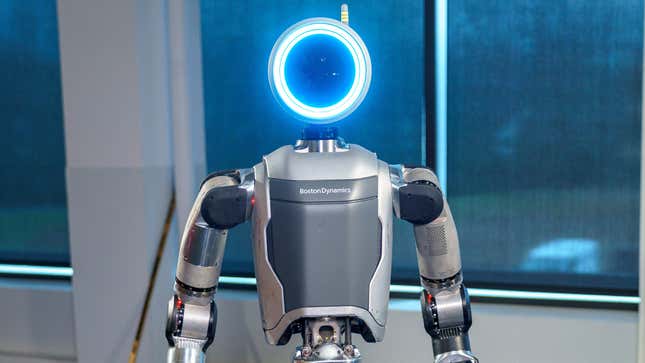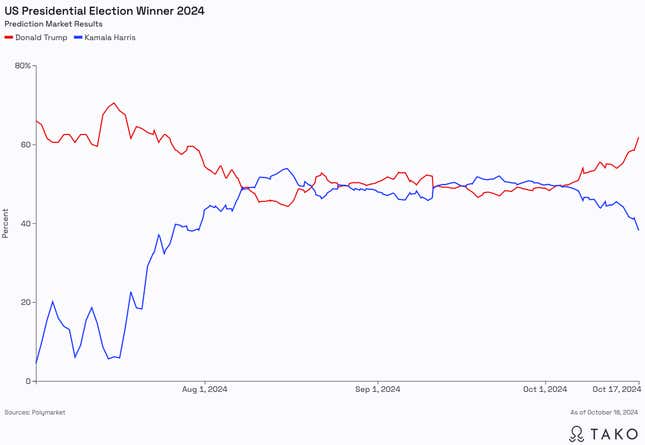
Each week, Quartz rounds up product launches, updates, and funding news from artificial intelligence-focused startups and companies.
Here’s what’s going on this week in the ever-evolving AI industry.

Each week, Quartz rounds up product launches, updates, and funding news from artificial intelligence-focused startups and companies.
Here’s what’s going on this week in the ever-evolving AI industry.

French AI startup Mistral announced two state-of-the-art edge models this week. Ministral 3B and Ministral 8B, dubbed les Ministraux, are for “on-device computing and at-the-edge use cases,” or devices such as smartphones and laptops.
The models were developed “to provide a compute-efficient and low-latency solution” to companies working on applications such as “on-device translation, internet-less smart assistants,” and autonomous robots, Mistral said.

Lightmatter, a startup that builds photonic tech for chips used in data centers, announced a $400 million Series D funding round this week that values the company at $4.4 billion. The round, which brings Lightmatter’s total capital raised to $850 million, was led by T. Rowe Price Associates.
With the funding, Lightmatter said it plans to deploy its Passage technology to data center partners, “enabling the scaling required for sustained AI innovation.”
“We’re not just advancing AI infrastructure — we’re reinventing it,” Lightmatter co-founder and chief executive Nick Harris said in a statement. “With Passage, the world’s fastest photonic engine, we’re setting a new standard for performance and breaking through the barriers that limit AI computing. This funding accelerates our ability to scale, delivering the supercomputers of tomorrow today.”

Soniox, a startup focused on voice AI, debuted its multimodal AI model, Omnio, which the company claims can “understand” audio and text inputs.
Omnio “excels at identifying speakers, their roles, and even the nuances of their interactions, including emotions, sentiment, and speaking styles,” Soniox said. The startup says its model is “on par” with OpenAI’s GPT-4o and other language models on benchmarks for text.
The company was co-founded by Ambroz Bizjak and Klemen Simonic, formerly of Meta.

Xscape Photonics, a startup using silicon photonics in data centers, announced a $44 million Series A funding round this week, which included investors such as Nvidia (NVDA) and Cisco (CSCO). The startup plans to use the funding to accelerate development of its ChromX platform, which is used for AI data center fabrics.
“Historically, performance and scalability challenges have been addressed by building bigger data centers to train large language models,” Vivek Raghunathan, co-founder and chief executive of Xscape Photonics, said in a statement, adding that the process is unsustainable and leads to issues with cost and energy consumption.
“At Xscape Photonics, we are on a mission to help our customers completely reimagine how they solve these challenges,” Raghunathan said. “This funding validates our mission and positions us for future growth to support next-generation AI data centers.”

Boston Dynamics (HYMTF) announced a research partnership with Toyota Research Institute (TM) this week to use the institute’s large behavior models to accelerate development of its general-purpose humanoid robots. The robotics company also plans to use its electric Atlas robot to accelerate the humanoids.
“There has never been a more exciting time for the robotics industry, and we look forward to working with TRI to accelerate the development of general-purpose humanoids,” Robert Playter, chief executive of Boston Dynamics, said in a statement. “This partnership is an example of two companies with a strong research-and-development foundation coming together to work on many complex challenges and build useful robots that solve real-world problems.”

Tako, an AI search engine that visualizes information, announced a $5.75 million seed funding round this week. The startup uses the “world’s most authoritative data sources” to generate visuals that provide factual, up-to-date information, it said.
With the funding, Tako aims to expand its tech’s capabilities, as well as “further its mission to combat misinformation and false narratives [...]”
“Tako grounds research and storytelling in reality by turning real-time, authoritative data into visual representations of knowledge,” Alex Rosenberg, co-founder and chief executive of Tako, said. “We’re making it easier than ever to access and share reliable information. We’ll use this funding to accelerate our plan to index all the world’s authoritative data and push the boundaries of how factual information can be visualized and persuasively shared.”
The startup was integrated into Perplexity’s search engine in May.

Articul8, a software company focused on generative AI for enterprises, announced a collaboration with Amazon Web Services to help customers building on the AWS platform develop and deploy their generative AI applications faster. The software company provides a full-stack generative AI platform that helps developers build, deploy, and manage enterprise-grade applications.
“Generative AI has the potential to transform entire industries, but its cost, complexity of deployment, and the required expertise around this emerging technology can be intimidating to customers,” Alan Braun, director of technology partnerships at AWS, said.
“This Strategic Collaboration Agreement with Articul8 will expand their ability to provide solutions that enable customers to build and deploy enterprise-grade Generative AI applications on AWS and help customers achieve meaningful business outcomes at scale.”